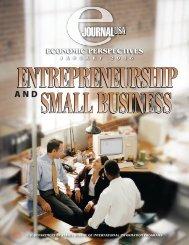s. history us history us history - Embassy of the United States
s. history us history us history - Embassy of the United States
s. history us history us history - Embassy of the United States
- No tags were found...
Create successful ePaper yourself
Turn your PDF publications into a flip-book with our unique Google optimized e-Paper software.
CHAPTER 13: DECADES OF CHANGE: 1960-1980OUTLINE OF U.S. HISTORYimposing wage and price controls,a policy in which <strong>the</strong> Right had nolong-term faith, in 1971. In <strong>the</strong> shortrun, <strong>the</strong>se decisions stabilized <strong>the</strong>economy and established favorableconditions for Nixon’s re-election in1972. He won an overwhelming victoryover peace-minded DemocraticSenator George McGovern.Things began to sour very quicklyinto <strong>the</strong> president’s second term.Very early on, he faced charges thathis re-election committee had manageda break-in at <strong>the</strong> Watergatebuilding headquarters <strong>of</strong> <strong>the</strong> DemocraticNational Committee and tha<strong>the</strong> had participated in a cover-up.Special prosecutors and congressionalcommittees dogged his presidency<strong>the</strong>reafter.Factors beyond Nixon’s controlundermined his economic policies.In 1973 <strong>the</strong> war between Israel andEgypt and Syria prompted SaudiArabia to embargo oil shipments toIsrael’s ally, <strong>the</strong> <strong>United</strong> <strong>States</strong>. O<strong>the</strong>rmember nations <strong>of</strong> <strong>the</strong> Organization<strong>of</strong> <strong>the</strong> Petroleum Exporting Countries(OPEC) quadrupled <strong>the</strong>ir prices.Americans faced both shortages,exacerbated in <strong>the</strong> view <strong>of</strong> many byover-regulation <strong>of</strong> distribution, andrapidly rising prices. Even when <strong>the</strong>embargo ended <strong>the</strong> next year, pricesremained high and affected all areas<strong>of</strong> American economic life: In 1974,inflation reached 12 percent, ca<strong>us</strong>ingdisruptions that led to even higherunemployment rates. The unprecedentedeconomic boom Americahad enjoyed since 1948 was grindingto a halt.Nixon’s rhetoric about <strong>the</strong> needfor “law and order” in <strong>the</strong> face <strong>of</strong>rising crime rates, increased drug<strong>us</strong>e, and more permissive viewsabout sex resonated with moreAmericans than not. But this concernwas insufficient to quell concernsabout <strong>the</strong> Watergate break-inand <strong>the</strong> economy. Seeking to energizeand enlarge his own politicalconstituency, Nixon lashed out atdemonstrators, attacked <strong>the</strong> pressfor distorted coverage, and soughtto silence his opponents. Instead, heleft an unfavorable impression withmany who saw him on television andperceived him as unstable. Addingto Nixon’s troubles, Vice PresidentSpiro Agnew, his outspoken pointman against <strong>the</strong> media and liberals,was forced to resign in 1973, pleading“no contest” to a criminal charge<strong>of</strong> tax evasion.Nixon probably had not knownin advance <strong>of</strong> <strong>the</strong> Watergate burglary,but he had tried to cover it up,and had lied to <strong>the</strong> American peopleabout it. Evidence <strong>of</strong> his involvementmounted. On July 27, 1974, <strong>the</strong>Ho<strong>us</strong>e Judiciary Committee votedto recommend his impeachment.Facing certain o<strong>us</strong>ter from <strong>of</strong>fice, heresigned on Aug<strong>us</strong>t 9, 1974.THE FORD INTERLUDENixon’s vice president, GeraldFord (appointed to replace Agnew),was an unpretentio<strong>us</strong> man who hadspent most <strong>of</strong> his public life in Congress.His first priority was to restoretr<strong>us</strong>t in <strong>the</strong> government. However,feeling it necessary to head <strong>of</strong>f <strong>the</strong>spectacle <strong>of</strong> a possible prosecution<strong>of</strong> Nixon, he issued a blanket pardonto his predecessor. Although it wasperhaps necessary, <strong>the</strong> move wasnone<strong>the</strong>less unpopular.In public policy, Ford followed<strong>the</strong> course Nixon had set. Economicproblems remained serio<strong>us</strong>, as inflationand unemployment continuedto rise. Ford first tried to reassure<strong>the</strong> public, much as Herbert Hooverhad done in 1929. When that failed,he imposed measures to curb inflation,which sent unemploymentabove 8 percent. A tax cut, coupledwith higher unemployment benefits,helped a bit but <strong>the</strong> economyremained weak.In foreign policy, Ford adoptedNixon’s strategy <strong>of</strong> detente. Perhapsits major manifestation was <strong>the</strong>Helsinki Accords <strong>of</strong> 1975, in which<strong>the</strong> <strong>United</strong> <strong>States</strong> and Western Europeannations effectively recognizedSoviet hegemony in Eastern Europein return for Soviet affirmation<strong>of</strong> human rights. The agreementhad little immediate significance,but over <strong>the</strong> long run may havemade maintenance <strong>of</strong> <strong>the</strong> Sovietempire more difficult. Westernnations effectively <strong>us</strong>ed periodic“Helsinki review meetings” to callattention to vario<strong>us</strong> ab<strong>us</strong>es <strong>of</strong> humanrights by Communist regimes<strong>of</strong> <strong>the</strong> Eastern bloc.THE CARTER YEARSJimmy Carter, former Democraticgovernor <strong>of</strong> Georgia, won <strong>the</strong> presidencyin 1976. Portraying himselfduring <strong>the</strong> campaign as an outsiderto Washington politics, he promiseda fresh approach to governing, buthis lack <strong>of</strong> experience at <strong>the</strong> nationallevel complicated his tenure from<strong>the</strong> start. A naval <strong>of</strong>ficer and engineerby training, he <strong>of</strong>ten appearedto be a technocrat, when Americanswanted someone more visionary tolead <strong>the</strong>m through troubled times.In economic affairs, Carter atfirst permitted a policy <strong>of</strong> deficitspending. Inflation rose to 10 percenta year when <strong>the</strong> Federal ReserveBoard, responsible for setting monetarypolicy, increased <strong>the</strong> moneysupply to cover deficits. Carterresponded by cutting <strong>the</strong> budget,but cuts affected social programs at<strong>the</strong> heart <strong>of</strong> Democratic domesticpolicy. In mid-1979, anger in <strong>the</strong>financial community practicallyforced him to appoint Paul Volckeras chairman <strong>of</strong> <strong>the</strong> Federal Reserve.Volcker was an “inflation hawk”who increased interest rates in anattempt to halt price increases, at<strong>the</strong> cost <strong>of</strong> negative consequencesfor <strong>the</strong> economy.Carter also faced criticism for hisfailure to secure passage <strong>of</strong> an effectiveenergy policy. He presenteda comprehensive program, aimedat reducing dependence on foreignoil, that he called <strong>the</strong> “moral equivalent<strong>of</strong> war.” Opponents thwartedit in Congress.Though Carter called himself apopulist, his political priorities werenever wholly clear. He endorsedgovernment’s protective role, but290291












